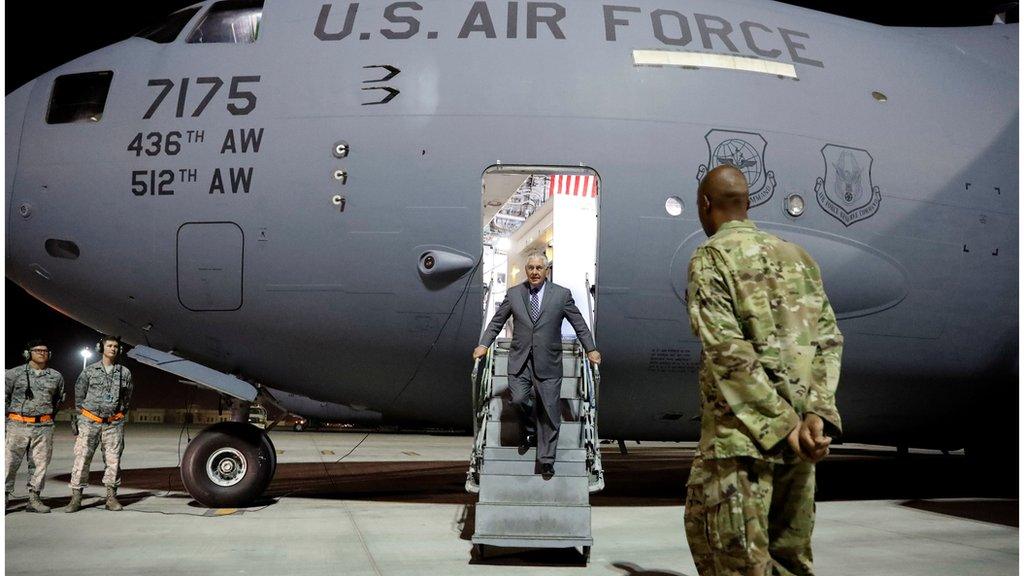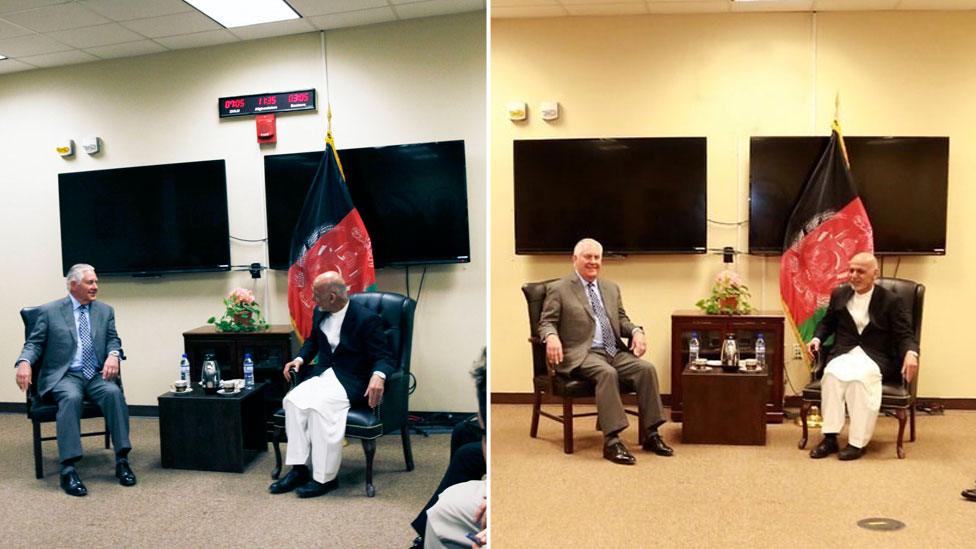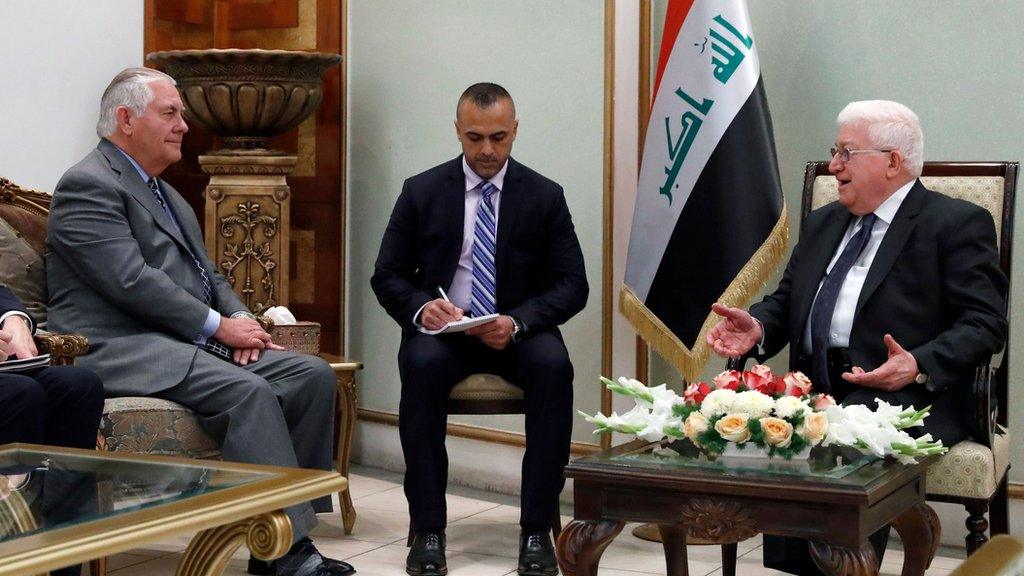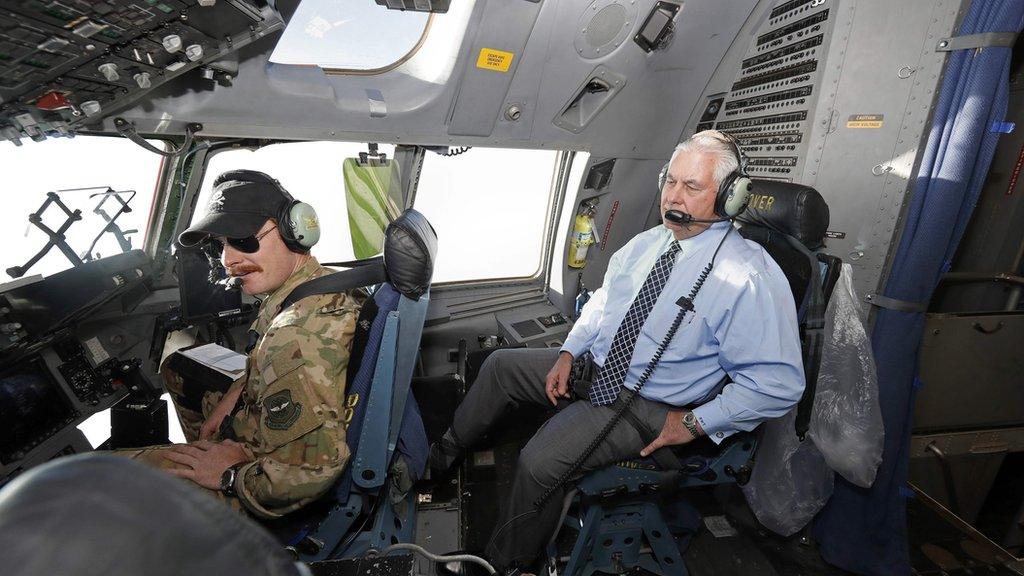Rex Tillerson tours war zones as US allies quarrel
- Published

Two war zones in one day for the US secretary of state
Whatever else one may say about Rex Tillerson, the man has stamina.
Which other US Secretary of State has dropped in on Afghanistan and Iraq in the same day?
These were first time visits for him, but conducted with great secrecy amidst ongoing, even heightened, security concerns despite more than 15 years of war.
In Afghanistan, Mr Tillerson was on the back foot. He arrived amidst a total news blackout after a particularly bloody week of Taliban attacks, pledging American support to fight the group until "they understand they will never win a military victory".
In the Middle East he should have been on the front foot: the US is justifiably celebrating military victories against the Islamic State group, having routed the militants from their strongholds in Iraq and Syria with the help of local forces.
But the mood music here during his visit was largely that of crucial US allies in conflict with each other.
Qatar crisis: What you need to know
Where will the Qatar crisis lead?
The Americans have been laser focused on defeating IS, and successfully rallied diverse parties to the common cause. As that campaign winds down though, the region is reorganising, and Washington will have to broaden its political and diplomatic engagement if it wants to shape the outcome.


Rex Tillerson meets Afghan President Ashraf Ghani, but something is amiss in these two photos

The Trump administration is particularly concerned that Iran is taking advantage of gains against the Islamic State group to expand its influence, which the US describes as "malign activity" intent on destabilising the region.
Take Iraq, for instance. Shortly before Mr Tillerson arrived, Iranian-backed Shia militias helped the Iraqi security forces reassert control of territory the Kurds had occupied in the north of the country during the fight against IS.
These paramilitary fighters are Iraqi but trained and armed by Iran.
Mr Tillerson urged restraint on the Kurds and the Iraqi government, saying he was "saddened" by this dispute between US friends. But it was reportedly, external an Iranian general who talked some of the Kurds into giving in without a fight before the operation was launched.

Rex Tillerson meets with Iraq's President Fuad Massum in Baghdad
And the secretary got a sharp rebuke from the Iraqi Prime Minister Haider Abadi when he called on the Shia militias to disband or leave the country. Mr Abadi's office called them patriots, not proxies, adding that "no party has the right to interfere in Iraqi matters".
The high point of Mr Tillerson's Middle East tour was a ceremony establishing a joint council for Iraq to coordinate economic and security matters with Saudi Arabia, strengthening a nascent rapprochement after decades of hostility.
Washington is pushing Saudi Arabia and other Sunni Arab countries to invest in Iraq's post-war reconstruction as a way to curb the dominance of Iran, their arch rival.
But America's top diplomat was unable to convince the Saudis to start talks aimed at resolving a more recent dispute, with Qatar.
Riyadh and three other Arab states refuse to ease the economic embargo they imposed in June, accusing Doha of financing terrorism and undermining their governments.

Tillerson heads to Bagram air base on a surprise visit to Afghanistan
Qatar denies the allegations and Mr Tillerson said the United States, which has two military bases between the feuding five, was among those feeling the negative consequences.
The US uses the Gulf Arab countries as a launch pad for its military operations in the region and sees them as a bulwark against Iran.
So it is ironic that the only country benefitting from the crisis is Iran - Mr Tillerson noted pointedly that Tehran has become Qatar's economic lifeline. Ironic also is the fact that his trip followed the White House announcement of a new strategy for confronting Iran, aimed at rolling back its gains in the region.